(English Medium)
Academic Year: 2018-2019
Date: March 2019
Advertisements
1. Attempt all questions from Section 1
2. Attempt any four questions from Section 2
Name the following :
(i) The layer of the eyeball that provides nourishment to the eye.
Chapter: [0.033] Nervous System and Sense Organs
Name the following :
One gaseous compound which depletes the ozone layer.
Chapter: [0.06] Pollution
Name the following:
The structure which connects the placenta and the foetus.
Chapter: [0.035] The Reproductive System
Give appropriate biological/technical terms for the following:
A pair of corresponding chromosomes of the same size and shape, one from each parent.
Chapter: [0.013000000000000001] Genetics – Some Basic Fundamentals
The compound formed when haemoglobin combines with carbon dioxide in blood.
Chapter: [0.031] The Circulatory System
Correct and rewrite the statements by changing the biological term that is underlined for the statement:
The theory of Inheritance of Acquired Characters was proposed by Watson and Crick.
Chapter: [0.013000000000000001] Genetics – Some Basic Fundamentals
Correct and rewrite the statements by changing the biological term that is underlined for the statement:
The protective sac which develops around the developing embryo is called the Pericardium.
Chapter: [0.035] The Reproductive System
Correct and rewrite the statements by changing the biological term that is underlined for the statement:
Mainitaining balance of the body and coordinating muscular activities is carried out by the cerebrum.
Chapter: [0.033] Nervous System and Sense Organs
Correct and rewrite the statements by changing the biological term that is underlined for the statement:
The kidney is composed of number of neurons.
Chapter: [0.032] The Excretory System (Elimination of Body Wastes)
Correct and rewrite the statements by changing the biological term that is underlined for the statement:
The part of the eye which can be donated from a clinically dead person is the Retina.
Chapter: [0.033] Nervous System and Sense Organs [0.034] Sense Organs
Give suitable biological reasons for the following statement:
The birth rate in India is very high.
Chapter: [0.04] Population
Give a scientific reason:
Carbon monoxide is highly dangerous when inhaled.
Chapter: [0.031] The Circulatory System
Give suitable biological reasons for the following statement:
Root hairs become flaccid and droop when excess fertilizers are added to the moist soil around them.
Chapter: [0.021] Absorption by Roots: The Processes Involved
Give suitable biological reasons for the following statement :
Acid rain is harmful to the environment.
Chapter: [0.06] Pollution
Give suitable biological reasons for the following statement :
All life on Earth is supported by Photosynthesis.
Chapter: [0.023] Photosynthesis: Provider of Food for All [0.023] Photosynthesis: Provider of Food for All
Match the items given in Column A with the most appropriate ones in Column B and REWRITE the correct matching pairs :
Column A Column B
(i) Cranial nerves Testosterone
(ii) Leydig cells Natural reflex
(iii) Acetylcholine 12 pairs
(iv) Spinal nerves Prolactin
(v) Sneezing Neurotransmitter
- 18 pairs
- 31 pairs
- Conditioned reflex
Chapter: [0.031] The Circulatory System
Choose the correct answer from the four options given below :
(i) While recording the pulse rate, where exactly does a doctor press on our wrist ?
Nerve
Vein
Artery
Capillary
Chapter: [0.031] The Circulatory System
Choose the correct answer from the four options given below :
In a human male, a sperm will contain :
Both X and Y chromosomes
Only Y chromosome
Only X chromosome
Either X or Y chromosome
Chapter: [0.013000000000000001] Genetics – Some Basic Fundamentals
A muscular wall is absent in ______.
Capillary
Venule
Arteriole
Vein
Chapter: [0.031] The Circulatory System
Choose the correct answer from the four options given below :
On which day of the menstrual cycle does ovulation take place ?
5th day
28th day
14th day
1st day
Chapter: [0.035] The Reproductive System
Choose the correct answer from the four options given below :
Which one of the following does not affect the rate of transpiration ?
Light
Humidity
Wind
Age of the plant
Chapter: [0.022000000000000002] Transpiration
Identify the ODD term in each set and name the CATEGORY to which the remaining three belong :
Example : glucose, starch, cellulose, calcium
Odd term : calcium
Category : others are different types of carbohydrates
Addison’s disease, Cushing’s Syndrome, Acromegaly, Leukemia
Chapter: [0.034] The Endocrine System
Identify the ODD term in each set and name the CATEGORY to which the remaining three belong :
Example : glucose, starch, cellulose, calcium
Odd term : calcium Category : others are different types of carbohydrates
Insulin, Adrenaline, Pepsin, Thyroxine
Chapter: [0.034] The Endocrine System
Identify the ODD term in each set and name the CATEGORY to which the remaining three belong :
Axon, Dendron, Photon, Cyton
Chapter: [0.033] Nervous System and Sense Organs
Identify the ODD term in each set and name the CATEGORY to which the remaining three belong :
Example : glucose, starch, cellulose, calcium
Odd term : calcium
Category : others are different types of carbohydrates
Chicken pox, Colour blindness, Haemophilia, Albinism
Chapter: [0.013000000000000001] Genetics – Some Basic Fundamentals
Identify the ODD term in each set and name the CATEGORY to which the remaining three belong :
Example : glucose, starch, cellulose, calcium
Odd term : calcium
Category : others are different types of carbohydrates
Polythene bag, Crop residue, Animal waste, Decaying vegetable.
Chapter: [0.06] Pollution
Expand the following biological abbreviations :
(i) ABA
Chapter: [0.022000000000000002] Transpiration
Expand the following biological abbreviations :
IAA
Chapter: [0.022000000000000002] Transpiration
Expand the following biological abbreviations :
ATP
Chapter: [0.023] Photosynthesis: Provider of Food for All [0.023] Photosynthesis: Provider of Food for All
Expand the following biological abbreviations :
DNA
Chapter: [0.012] Cell Cycle, Cell Division and Structure of Chromosomes [0.013000000000000001] Genetics – Some Basic Fundamentals
Expand the following biological abbreviation:
TSH
Chapter: [0.034] The Endocrine System
Study the picture given below and answer the following questions :
Water pollution
Chapter: [0.06] Pollution
Advertisements
Study the picture given below and answer the following questions :
Name one pollutant that causes the above the pollution.
Chapter: [0.06] Pollution
Study the picture given below and answer the following questions :
Mention the impact of this pollution on human health.
Chapter: [0.06] Pollution
Study the picture given below and answer the following questions :
State one measure to control this pollution.
Chapter: [0.06] Pollution
Study the picture given below and answer the following questions :
What is a ‘Pollutant’ ? Explain the term.
Chapter: [0.06] Pollution
Given below is an experiment setup to demonstrate a particualr tropic movement in germinating seeds. Study the diagram and answer the questions that follow : 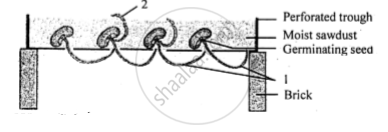
Label the parts 1 and 2.
Chapter: [0.023] Photosynthesis: Provider of Food for All [0.023] Photosynthesis: Provider of Food for All
Given below is an experiment setup to demonstrate a particualr tropic movement in germinating seeds. Study the diagram and answer the questions that follow :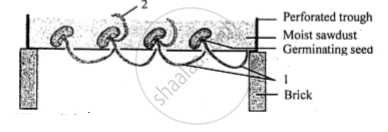
(ii) Name the tropic movement shown by part 1.
Chapter: [0.023] Photosynthesis: Provider of Food for All [0.023] Photosynthesis: Provider of Food for All
Given below is an experiment setup to demonstrate a particualr tropic movement in germinating seeds. Study the diagram and answer the questions that follow :
Part 1 is affected by two stimuli. Name them. Which one of the two is stronger? 
Part 1 is affected by two stimuli. Name them. Which one of the two is stronger?
Chapter: [0.023] Photosynthesis: Provider of Food for All [0.023] Photosynthesis: Provider of Food for All
Given below is an experiment setup to demonstrate a particualr tropic movement in germinating seeds. Study the diagram and answer the questions that follow : 
What is Thigmotropism? Give one example.
Chapter: [0.023] Photosynthesis: Provider of Food for All [0.023] Photosynthesis: Provider of Food for All
Given below is an experiment setup to demonstrate a particualr tropic movement in germinating seeds. Study the diagram and answer the questions that follow : 
What is meant by ‘Positive’ and ‘Negative’ tropic movements in plants?
Chapter: [0.023] Photosynthesis: Provider of Food for All [0.023] Photosynthesis: Provider of Food for All
Mention the exact location of the following :
Testis
Chapter: [0.035] The Reproductive System
Mention the exact location of the following :
Incus
Chapter: [0.033] Nervous System and Sense Organs [0.034] Sense Organs
Mention the exact location of the following :
Thylakoids
Chapter: [0.023] Photosynthesis: Provider of Food for All [0.023] Photosynthesis: Provider of Food for All
Mention the exact location of the following :
Amniotic fluid
Chapter: [0.035] The Reproductive System
Mention the exact location of the following :
Corpus callosum
Chapter: [0.035] The Reproductive System
The diagram given below represents an experiment to prove the importance of a factor in photosynthesis. Answer the questions that follow : 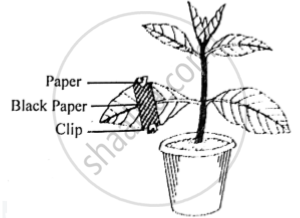
Name the factor studied in this experiment.
Chapter: [0.023] Photosynthesis: Provider of Food for All [0.023] Photosynthesis: Provider of Food for All
The diagram given below represents an experiment to prove the importance of a factor in photosynthesis. Answer the questions that follow :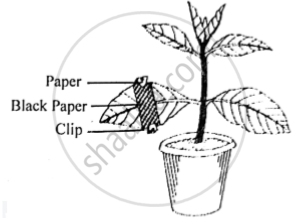
What will you observe in the experimental leaf after the starch test?
Chapter: [0.023] Photosynthesis: Provider of Food for All [0.023] Photosynthesis: Provider of Food for All
The diagram given below represents an experiment to prove the importance of a factor in photosynthesis. Answer the questions that follow :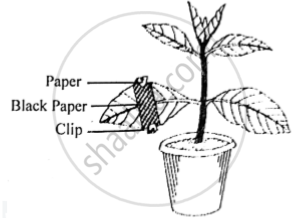
Explain the process of Photosynthesis.
Chapter: [0.023] Photosynthesis: Provider of Food for All [0.023] Photosynthesis: Provider of Food for All
The diagram given below represents an experiment to prove the importance of a factor in photosynthesis. Answer the questions that follow :
Give a balanced chemical equation to represent the process of photosynthesis.
Chapter: [0.023] Photosynthesis: Provider of Food for All [0.023] Photosynthesis: Provider of Food for All
The diagram given below represents an experiment to prove the importance of a factor in photosynthesis. Answer the questions that follow : 
Draw a neat, labelled diagram of an experimental steup to show that oxygen is released during photosynthesis
Chapter: [0.023] Photosynthesis: Provider of Food for All [0.023] Photosynthesis: Provider of Food for All
State the main functions of the following:
Medulla Oblongata
Chapter: [0.023] Photosynthesis: Provider of Food for All [0.023] Photosynthesis: Provider of Food for All
State the main functions of the following:
Cytokinins
Chapter: [0.023] Photosynthesis: Provider of Food for All [0.023] Photosynthesis: Provider of Food for All
State the main functions of the following:
Coronary Artery
Chapter: [0.033] Nervous System and Sense Organs [0.034] Sense Organs
State the main functions of the following:
Seminal Vesicles
Chapter: [0.033] Nervous System and Sense Organs [0.034] Sense Organs
The diagram given below represents an organ system in the human body. Study the same and answer the questions that follow :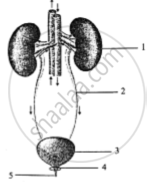
Identify the system
Chapter: [0.032] The Excretory System (Elimination of Body Wastes)
The diagram given below represents an organ system in the human body. Study the same and answer the questions that follow :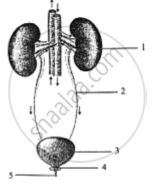
Label the parts marked 2 and 4. Mention the function of part 5.
Chapter: [0.032] The Excretory System (Elimination of Body Wastes)
The diagram given below represents an organ system in the human body. Study the same and answer the questions that follow :
Name the structural and functional units of the part marked 1.
Chapter: [0.032] The Excretory System (Elimination of Body Wastes)
The diagram given below represents an organ system in the human body. Study the same and answer the questions that follow :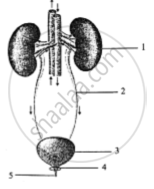
What is the fluid that accumulates in part 3?
Which is the main nitrogenous waste present in it?
Chapter: [0.032] The Excretory System (Elimination of Body Wastes)
The diagram given below represents an organ system in the human body. Study the same and answer the questions that follow :
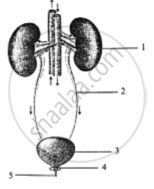
Draw a neat, labelled diagram showing the longitudinal section of part 1.
Chapter: [0.034] The Endocrine System
The diagram give below represents an endocrine gland in the human body. Study the diagram and answer the following questions:
Identify the endocrine gland. Where is it located?
Chapter: [0.034] The Endocrine System
The diagram give below represents an endocrine gland in the human body. Study the diagram and answer the following questions:
Why is the above gland referred to as the ‘Master gland’?
Chapter: [0.034] The Endocrine System
The diagram give below represents an endocrine gland in the human body. Study the diagram and answer the following questions:
Name the hormone which in deficiency causes Diabetes Inspidus. How does this disorder differ from Diabetes Mellitus?
Chapter: [0.034] The Endocrine System
Advertisements
The diagram give below represents an endocrine gland in the human body. Study the diagram and answer the following questions: 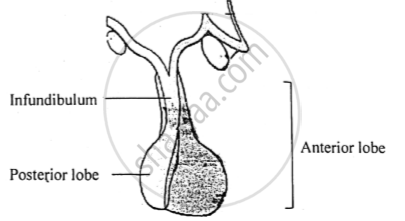
Explain the term ‘Hormone’. What is the role of Tropic hormones in the human body?
Chapter: [0.034] The Endocrine System
The diagram give below represents an endocrine gland in the human body. Study the diagram and answer the following questions:
Which lobe of the above gland secretes?
1. Oxytocin
2. ACTH
3. Growth hormone
Chapter: [0.034] The Endocrine System
Given below is an apparatus which has setup to investigate a physiological process in plants. The setup was placed in bright sunlight. Answer the questions that follow: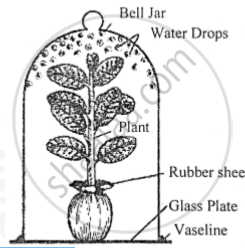
Name the process being studies. Define the process.
Chapter: [0.022000000000000002] Transpiration
Given below is an apparatus which has setup to investigate a physiological process in plants. The setup was placed in bright sunlight. Answer the questions that follow:
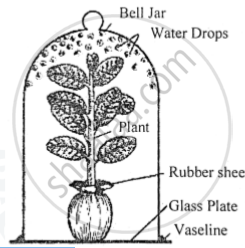
Why was the pot enclosed in a rubber sheet?
Chapter: [0.022000000000000002] Transpiration
Given below is an apparatus which has setup to investigate a physiological process in plants. The setup was placed in bright sunlight. Answer the questions that follow: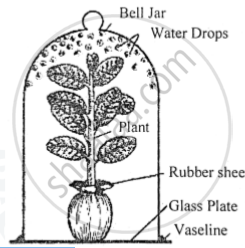
Name the process being studies. Define the process.
Chapter: [0.022000000000000002] Transpiration
Given below is an apparatus which has setup to investigate a physiological process in plants. The setup was placed in bright sunlight. Answer the questions that follow: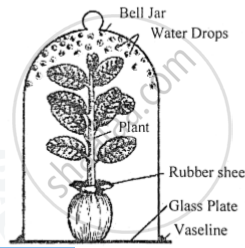
List two adaptations in plants to reduce the above process.
Chapter: [0.022000000000000002] Transpiration
Given below is an apparatus which has setup to investigate a physiological process in plants. The setup was placed in bright sunlight. Answer the questions that follow: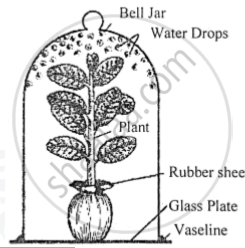
Draw a neat, labelled diagram of a stomatal apparatus.
Chapter: [0.022000000000000002] Transpiration
Given below are two stages in the evolution of man. Study them and answer the questions that follow: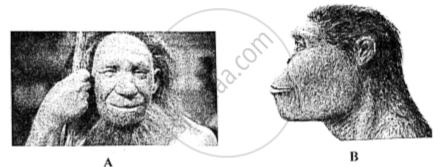
Identify Australopithecus and Neanderthal man from the above pictures.
Chapter: [0.05] Human Evolution
Given below are two stages in the evolution of man. Study them and answer the questions that follow:
Mention two characteristic features each for two stages.
Chapter: [0.05] Human Evolution
Given below are two stages in the evolution of man. Study them and answer the questions that follow: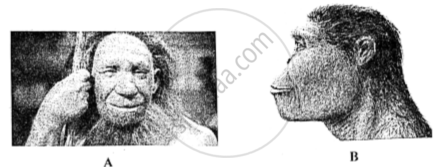
Who proposed the theory of ‘Natural Selection’?
Chapter: [0.05] Human Evolution
Given below are two stages in the evolution of man. Study them and answer the questions that follow:
Name the organisum used as an example to explain ‘Industrial Melanism’.
Chapter: [0.05] Human Evolution
Given below are two stages in the evolution of man. Study them and answer the questions that follow: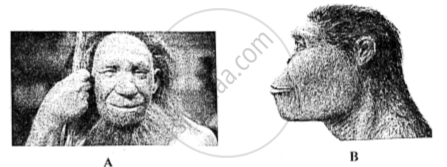
Give two examples of Vestigial organs in humans.
Chapter: [0.05] Human Evolution
In Mendel’s experiments, tall pea plants (T) are dominant over dwarf pea plants (t).
What is the phenotype and genotype of the F1 generation if a homozygous tall plant is crossed with a homozygous dwarf plant?
Chapter: [0.013000000000000001] Genetics – Some Basic Fundamentals
In Mendel’s experiments, tall pea plants (T) are dominant over dwarf pea plants (t).
Draw a Punnett square board to show the gametes and offspring when both the parents are heterozygous for tallness.
Chapter: [0.013000000000000001] Genetics – Some Basic Fundamentals
In Mendel’s experiments, tall pea plants (T) are dominant over dwarf pea plants (t).
What is the phenotypic ratio and genotypic ratio of the above cross in (ii)?
Chapter: [0.013000000000000001] Genetics – Some Basic Fundamentals
In Mendel’s experiments, tall pea plants (T) are dominant over dwarf pea plants (t).
State Mendel’s Law of Dominance.
Chapter: [0.013000000000000001] Genetics – Some Basic Fundamentals
In Mendel’s experiments, tall pea plants (T) are dominant over dwarf pea plants (t).
What is a Dihybrid Cross?
Chapter: [0.013000000000000001] Genetics – Some Basic Fundamentals
Given below is a diagram representing a stage during the mitotic cell division. Study thediagram and answer the following questions: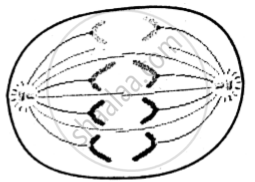
Identify the stage by giving a suitable reason.
Chapter: [0.012] Cell Cycle, Cell Division and Structure of Chromosomes
Given below is a diagram representing a stage during the mitotic cell division. Study thediagram and answer the following questions:
Is it a plant or an animal cell? Give a reason to support your answer.
Chapter: [0.012] Cell Cycle, Cell Division and Structure of Chromosomes
Given below is a diagram representing a stage during the mitotic cell division. Study thediagram and answer the following questions: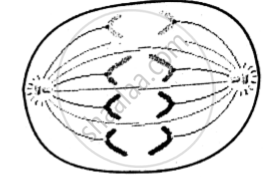
Draw a neat, labelled diagram of the stage which follows the one shown in the diagram.
Chapter: [0.012] Cell Cycle, Cell Division and Structure of Chromosomes
How many chromosomes will each daughter cell have after the completion of the above division? 
How many chromosomes will each daughter cell have after the completion of the above division?
Chapter: [0.012] Cell Cycle, Cell Division and Structure of Chromosomes
Answer the following questions briefly:
How are the cytons and axons placed in the brain and the spinal cord?
Chapter: [0.033] Nervous System and Sense Organs
Which part of the human ear gives ‘ Dynamic balance’ to the body?
Chapter: [0.033] Nervous System and Sense Organs [0.034] Sense Organs
Which part of the human ear gives ‘Static balance’ to the body?
Chapter: [0.033] Nervous System and Sense Organs [0.034] Sense Organs
Answer the following questions briefly:
Explain how the human eye adapts itself to bright light and dim light.
Chapter: [0.033] Nervous System and Sense Organs
Answer the following questions briefly:
What is Parthenocarpy? Give one example.
Chapter: [0.05] Human Evolution
Answer the following questions briefly:
Mention any two objectives of ‘Swachh Bharat Abhiyan’.
Chapter: [0.05] Human Evolution
The diagram given below represents a system in the human body. Stud the diagram and answer the following questions:
Identify the system
Chapter: [0.035] The Reproductive System
The diagram given below represents a system in the human body. Stud the diagram and answer the following questions:
Identify the system
Chapter: [0.035] The Reproductive System
The diagram given below represents a system in the human body. Stud the diagram and answer the following questions: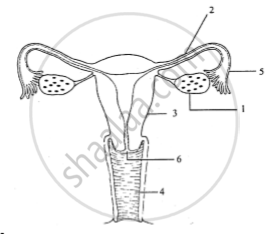
Label the parts marked 5 and 6.
Chapter: [0.035] The Reproductive System
The diagram given below represents a system in the human body. Stud the diagram and answer the following questions: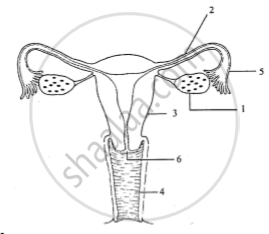
Name the two hormones secreted by 1.
Chapter: [0.035] The Reproductive System
The diagram given below represents a system in the human body. Stud the diagram and answer the following questions: 
Mention the number and the name of the part involved in fertilization and implantation from the above diagram.
Chapter: [0.035] The Reproductive System
The diagram given below represents a system in the human body. Stud the diagram and answer the following questions: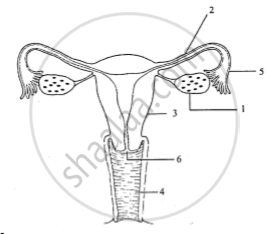
Mention the surgical methods of contraception in:
1. Human males
2. Human females.
Chapter: [0.04] Population
Other Solutions
Submit Question Paper
Help us maintain new question papers on Shaalaa.com, so we can continue to help studentsonly jpg, png and pdf files
CISCE previous year question papers ICSE Class 10 Biology with solutions 2018 - 2019
Previous year Question paper for CISCE ICSE Class 10 -2019 is solved by experts. Solved question papers gives you the chance to check yourself after your mock test.
By referring the question paper Solutions for Biology, you can scale your preparation level and work on your weak areas. It will also help the candidates in developing the time-management skills. Practice makes perfect, and there is no better way to practice than to attempt previous year question paper solutions of CISCE ICSE Class 10 .
How CISCE ICSE Class 10 Question Paper solutions Help Students ?
• Question paper solutions for Biology will helps students to prepare for exam.
• Question paper with answer will boost students confidence in exam time and also give you an idea About the important questions and topics to be prepared for the board exam.
• For finding solution of question papers no need to refer so multiple sources like textbook or guides.
